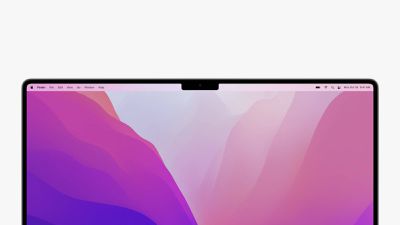While users and developers come to terms with the fact that the last-minute notch rumor for the new MacBook Pros was true, Apple has released new Human Interface Guidelines explaining how developers can make the best use of the extended screen areas around the camera housing if they think their app would benefit from it.

According to the new documentation, the fullscreen mode in macOS Monterey features a "compatibility mode" that automatically accounts for the camera housing by placing a black bar across the top of the screen to hide the notch and prevent app content from being placed there.
However, macOS also includes a new "NSPrefersDisplaySafeAreaCompatibilityMode" property list key that lets developers specify whether their apps should conform to compatibility mode or if their apps can expand to use the space on either side of the notch.
On Macs that include a camera housing in the screen bezel, the system provides a compatibility mode to prevent apps from unintentionally putting content in the region the housing occupies. When this mode is active, the system changes the active area of the display to avoid the camera housing. The new active area ensures your app's contents are always visible and not obscured by the camera housing.

On Macs that have a notch, the Finder automatically adds a checkbox to an app's Get Info panel that can be used to manually enable or disable the new compatibility mode. Alternately, developers can force compatibility mode on or off using new code properties that define the safe area of the screen and allow them to make use of the areas on either side of the notch for active content.
Developers should confirm that their app layouts do not overlap with the notch area before setting the NSPrefersDisplaySafeAreaCompatibilityMode key to "false" to bypass compatibility mode.
The inclusion of a notch allowed Apple to make the bezels on the new 14-and 16-inch MacBook Pros considerably thinner compared to the previous 13-inch and 16-inch models. The new Liquid Retina XDR displays also feature ProMotion technology, which allows the screen to run at as high as 120Hz, and as low as 24Hz, similar to the iPad Pro.
The new MacBook Pros are available to order now and begin shipping next week, but delivery dates for various MacBook Pro configurations have already slipped, with some of the 16-inch MacBook Pro models now listing delivery dates ranging from November 2 to November 16, up from the original October 26 delivery date.
Update: This article was updated to clarify how the property list key for compatibility mode functions.
























